Related Research Articles

Sir Henry Rider Haggard was an English writer of adventure fiction romances set in exotic locations, predominantly Africa, and a pioneer of the lost world literary genre. He was also involved in land reform throughout the British Empire. His stories, situated at the lighter end of Victorian literature, continue to be popular and influential.
Thriller is a genre of fiction, having numerous, often overlapping subgenres. Thrillers are characterized and defined by the moods they elicit, giving viewers heightened feelings of suspense, excitement, surprise, anticipation and anxiety. Successful examples of thrillers are the films of Alfred Hitchcock.
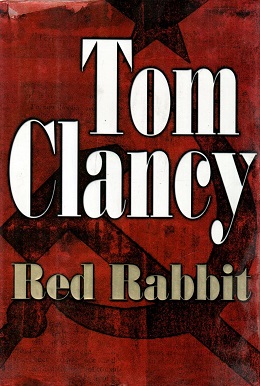
Red Rabbit is a spy thriller novel, written by Tom Clancy and released on August 5, 2002. The plot occurs a few months after the events of Patriot Games (1987), and incorporates the 1981 assassination attempt on Pope John Paul II. Main character Jack Ryan, now an analyst for the Central Intelligence Agency, takes part in the extraction of a Soviet defector who knows of a KGB plot to kill the pontiff. The book debuted at number one on The New York Times Best Seller list.
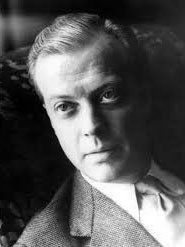
Eric Clifford Ambler OBE was an English author of thrillers, in particular spy novels, who introduced a new realism to the genre. Also working as a screenwriter, Ambler used the pseudonym Eliot Reed for books cowritten with Charles Rodda.

Allan Quatermain is the protagonist of H. Rider Haggard's 1885 novel King Solomon's Mines, its one sequel Allan Quatermain (1887), twelve prequel novels and four prequel short stories, totalling eighteen works. An English professional big game hunter and adventurer, in film and television he has been portrayed by Richard Chamberlain, Sean Connery, Cedric Hardwicke, Patrick Swayze and Stewart Granger among others.
William Haggard was the pseudonym of Richard Henry Michael Clayton, the son of the Rev. Henry James Clayton and Mabel Sarah Clayton. He was an English writer of fictional spy thrillers set in the 1960s through the 1980s, or, as the writer H. R. F. Keating called them, "action novels of international power." Like C. P. Snow, he was a quintessentially British Establishment figure who had been a civil servant in India, and his books vigorously put forth his perhaps idiosyncratic points of view. The principle character in most of his novels is the urbane Colonel Charles Russell of the fictional Security Executive,, who moves easily and gracefully along Snow's Corridors of Power in Whitehall. During the years of the fictional spy mania initially begun by the James Bond stories, Haggard was considered by most critics to be at the very top of the field.
The conspiracy thriller is a subgenre of thriller fiction. The protagonists of conspiracy thrillers are often journalists or amateur investigators who find themselves pulling on a small thread which unravels a vast conspiracy that ultimately goes "all the way to the top." The complexities of historical fact are recast as a morality play in which bad people cause bad events, and good people identify and defeat them. Conspiracies are often played out as "man-in-peril" stories, or yield quest narratives similar to those found in whodunits and detective stories.
Sir George Russell Clerk was a British civil servant in British India.

The Hound of the Baskervilles is a 1939 American gothic mystery film based on the 1902 Sherlock Holmes novel of the same name by Sir Arthur Conan Doyle. Directed by Sidney Lanfield, the film stars Basil Rathbone as Sherlock Holmes and Nigel Bruce as Dr. John Watson. Released by 20th Century Fox, it is the first of fourteen Sherlock Holmes films produced between 1939 and 1946 starring Rathbone and Bruce.
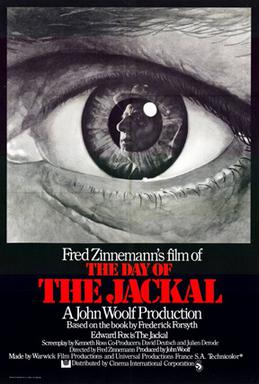
The Day of the Jackal is a 1973 political thriller film directed by Fred Zinnemann and starring Edward Fox and Michael Lonsdale. Based on the 1971 novel of the same name by Frederick Forsyth, the film is about a professional assassin known only as the "Jackal" who is hired to assassinate French president Charles de Gaulle in the summer of 1962.

The Secret of The Swordfish was the first story in the Blake and Mortimer comic album series by Edgar P. Jacobs. It describes how a far eastern empire takes over the world and the adventures of two Britons as they try to bring about the development of a weapon which will enable them to fight back. Drawing elements from the recent events of World War II as well as the emerging Cold War, the trilogy is set in an alternate reality of the 1950s, in which a Third World War is played out.
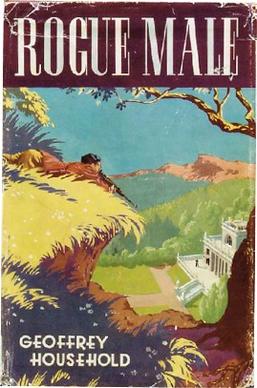
Rogue Male, by Geoffrey Household, is a classic thriller novel, published in 1939. The book was reissued in 2007 with an introduction by Victoria Nelson.

Thriller film, also known as suspense film or suspense thriller, is a broad film genre that evokes excitement and suspense in the audience. The suspense element found in most films' plots is particularly exploited by the filmmaker in this genre. Tension is created by delaying what the audience sees as inevitable, and is built through situations that are menacing or where escape seems impossible.

Memoirs of an Invisible Man is a 1987 science fiction novel by H. F. Saint.

The Hound of the Baskervilles is a 1983 British made-for-television mystery thriller film directed by Douglas Hickox, starring Ian Richardson as Sherlock Holmes and Donald Churchill as Dr. John H. Watson. It is based on Arthur Conan Doyle's 1902 novel The Hound of the Baskervilles.
A Very British Coup is a 1988 British political serial adapted from Chris Mullin's 1982 novel A Very British Coup in 1988 by screenwriter Alan Plater and director Mick Jackson. Starring Ray McAnally, the series was first screened on Channel 4 and won Bafta and Emmy awards, and was screened in more than 30 countries.

Venetian Blind is a 1959 suspense novel by the British author William Haggard published in England by Cassell and in the United States by Ives Washburn. It was Haggard's second of 21 books involving his urbane protagonist Colonel Charles Russell, the head of the unobtrusive but lethal Security Executive, a government counter-intelligence agency clearly based on the actual MI5 or Security Service, where he moves easily and gracefully along C.P. Snow's Corridors of Power in Whitehall. Like all of Haggard's books it has standard elements of suspense thrillers but in addition there is an almost Henry Jamiesian exposition of British establishment mores and character, in both the government and in the world of upper-class financiers, scientists, industrialists, their families, and hangers-on, making it very much a novel of character.

The Arena is a 1961 suspense novel by the British author William Haggard published in England by Cassell and in the United States by Washburn. It was Haggard's third of 21 books involving his urbane protagonist Colonel Charles Russell, the head of the unobtrusive but lethal Security Executive, a government counter-intelligence agency clearly based on the actual MI5 or Security Service, where he moves easily and gracefully along C.P. Snow's Corridors of Power in Whitehall. Like all of the other works by Haggard it is a standard novel of suspense, but combined, as usual with Haggard, with other elements: the reactions of those in high government positions who fear non-political events that could endanger Britain's place in the world, along with a tough-minded, even cynical depiction of financial shenanigans in the City of London. And like Venetian Blind, Haggard's previous book, it is very much a novel of character, albeit a bleak one.
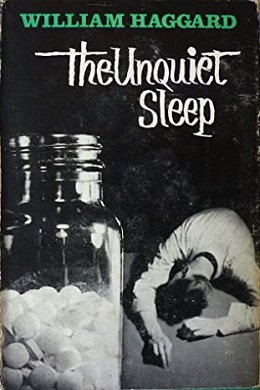
The Unquiet Sleep is a 1962 suspense novel by British author William Haggard which was published in England by Cassell and in the United States by Ives Washburn. It is the 4th novel in a series of 21 books that involve urbane protagonist, Colonel Charles Russell. Russel is the head of the Security Executive, a government counterintelligence agency based on the actual MI5 or Security Service. He moves easily and gracefully along C.P. Snow's Corridors of Power in Whitehall. As in Haggard's earlier books, it has the standard elements of a suspense thriller along with detailed examinations of character, but with more scenes of direct action and somewhat less dissection of character and motivation from the first three books.

The Antagonists is a 1964 suspense novel by the British author William Haggard published in England by Cassell and in the United States by Ives Washburn. It was Haggard's sixth of 21 books involving his protagonist Colonel Charles Russell, the urbane head of the unobtrusive but lethal Security Executive, a government counter-intelligence agency clearly based on the actual MI5 or Security Service, where he moves easily and gracefully along C.P. Snow's Corridors of Power in Whitehall. Like Haggard's earlier books it has standard elements of suspense thrillers along with detailed examinations of character, but in this case with more scenes of direct action and somewhat less dissection of character and motivation than in the first three books.
References
- ↑ From the back flap of the dust jacket of the Walker and Company American edition of The Conspirators, New York, 1967